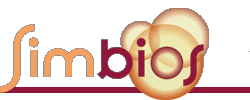|
|
OpenMM Visiting Scholar Program
Through our visiting scholars program for OpenMM, Simbios seeks to attract energetic and talented scholars from computer science, biochemistry, biophysics, and other fields to gain in-depth knowledge about molecular dynamics and the OpenMM software. OpenMM is open-source software that enables molecular dynamic calculations to be accelerated on high-performance computer architectures. It has demonstrated speed ups for both implicit solvent[1] and explicit solvent simulations[2] on graphics processing units (GPUs). See benchmarks. Its performance, openness, and extreme flexibility -- via custom forces and integrators -- make it truly unique among simulation codes. A well-designed framework provides an application layer and a library, so that non-programmers can easily and quickly run molecular dynamics (MD) simulations and develop custom algorithms on GPUs, while programmers are simultaneously able to integrate OpenMM cleanly into their own programs. Program DetailsThis year up to three individuals will be chosen to visit Simbios at Stanford University for a 4-week period between June and August. Each fellow will receive up to $7000 to cover travel and living expenses. During their visits, awardees will receive training and mentoring to help them achieve their research goals. They will have the opportunity to participate in formal meetings and in discussions with OpenMM experts to advance their research. See a list of previous visiting scholars and their projects. Application ProcessThe visiting scholars program is aimed at post-doctoral fellows, but others are welcome to apply. Individuals must meet the Stanford University Visiting Scholar criteria. A completed application packet should include the following:
We are particularly interested in proposals that take advantage of OpenMM's customization features; its application layer, providing example scripts for others; its open API that enables it to be easily integrated into another application. We also welcome projects that add new features to OpenMM or enhance OpenMM's performance. Send completed applications to simbiosfeedback@stanford.edu by midnight, March 9, 2014 Selection Process
Visiting scholars will be selected based on several factors, including:
Top candidates will be selected for phone and Skype interviews, after which the final selection will be made. DEADLINE: Midnight, March 9, 2014 AWARDEES ANNOUNCED: May, 2014 QUESTIONS? Email Joy Ku at simbiosfeedback@stanford.edu
Frequently Asked Questions What short-term housing options are available? You will be responsible for making your own travel and housing arrangements. Simbios can assist with reducing your out of pocket costs by pre-paying for reservations on your behalf. Off-campus housing options include: Oak Creek Apartments (short term lease available), craigslist, airbnb Palo Alto, Stanford Guest House, and other local hotels. Information about on-campus Stanford lodging can be found at the Stanford Community Housing page. Stanford also provides non-student summer housing (June 22 – Aug 18, 2013).
[1] OpenMM accelerated code running on NVIDIA GeForce GTX 280 GPU vs. conventional code with Amber9 running on Intel Xenon 2.66 GHz CPU. MS Friedrichs, et al., "Accelerating Molecular Dynamic Simulation on Graphics Processing Units," J. Comp. Chem., 2009, 30(6):864-872. |
|



